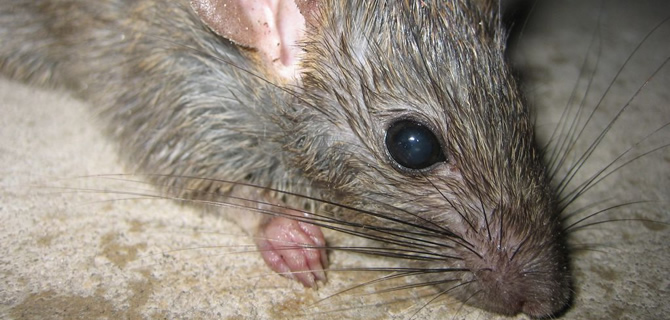
Rat Infestation:
Pest Control for Rats in Wolverhampton, Birmingham & The West Midlands
Latin Name: Rattus
Rats are some of the most serious rodent pests in the world. They can carry diseases such as leptospirosis, salmonella and campylobacter and cause structural damage to buildings by gnawing and burrowing. It can be found both indoors and outdoors and, once colonised indoors, will even use cavity walls to move around the premises and to create an undisturbed breeding environment. The most common rat found in the UK is the brown or norway rat (Rattus novegicus). The black rat associated with the black death is now rare and usually only found at ports.
The brown rat is generally brownish-grey in colour, with a paler greyish belly. An adult may weigh on average 340g. The brown rat is a burrowing animal, and will live indoors, outdoors and in sewers. When brown rats are found in buildings it is usually due to holes in the fabric of the building and/or defective drainage. Rats will also emerge from any unblocked sewer, which includes dry toilet bowls.
Rats infest over a million homes in the UK annually and nationally the problem appears to be on the increase.
Rats have the potential to spread a wide variety of diseases around the home and garden. This is because they tend to live in environments such as drains, sewers, and rubbish where germs can be found. These can then be spread wherever rats go via their fur, feet, urine or droppings. The main diseases of concern are Weil’s disease, and food poisoning diseases such as salmonella.
Rats can also damage property by gnawing at wood, lead and soft metals, electrical wiring, water pipes, and drainage systems.
Rats take between 2-3 months to reach sexual maturity and can have up to 7 litters per year with the average litter size being about 8.
TREATMENT & CONTROL
Treatment involves assessing the extent of the problem, laying baits or traps as necessary, checking the baits or traps regularly and removing the material at the end of the treatment. Rats are notoriously neophobic and may be reluctant to approach DIY bait stations. Our pest control operatives are experienced in identifying and locating runs and places of harbourage, and the placement and use of bait to overcome bait shyness. The use of rodenticide is controlled by the Control of Pesticides Regulations 1986. Sometimes more than one treatment will be required to ensure effective control.
Following our survey, a baiting programme will be discussed with you to take into account the particular circumstances and location of the infestation.
Commercial premises may require detailed reporting systems to include bait plans, COSHH assessments, monitoring reports, and hygiene, housekeeping and proofing recommendations.
Rats tend to have only a few feeding sites and so the key to successful control is to ensure there is a good quantity of bait available (sub-lethal doses can affect the level of control which will be achieved longer-term). Whole grain bait is the most commonly used, and active ingredients such as Difenacoum and Bromadialone can be used indoors and out. Rat burrows can be baited directly if safe to do so and trapping and use of gassing compounds such as Aluminium Phosphide (professionally trained operators only) can be considered
Birmingham Pest Control Services offers a same day pest control service to all our customers, starting at £45.00. We also provide a contract pest control service to our business operators and commercial clients.
At Birmingham Pest Control, we pride our selves on our complete discretion on all our pest control jobs. Therefore all our vehicles are unmarked, unlike major organisations.
At Birmingham Pest Control we offer complete discretion on our service
Contact us on: 01922 610 932 / 0121 450 9784 or for information on our pest control service.



 Birmingham Pest Control use unmarked vehicles for your discretion.
Birmingham Pest Control use unmarked vehicles for your discretion.